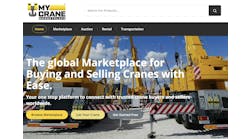Lewis, CEO of Fame Rental, talks about the potential of AI, the importance of accurate data, finding the truth, and more.
What is new in your software and technology?
Joe Lewis: We continue to expand our platform’s web presence (FameAir) to connect with – and do more – for rental businesses’ employees, customers, and vendors. We accomplish this by seamlessly connecting with integrations from best-of-breed service providers such as Avalara (for sales tax management), Century eBiz (credit card processing), Rouse (rental performance analytics), SmartEquip (maintenance lifecycle management), Samsara (telematics), Mapbox (route efficiency), Insight (advanced reporting), and others. This approach allows us to scale our platform from smaller, less sophisticated rental companies to large and intricate enterprise-level companies.
What effects has AI had on your software and technology and what potential do you see going forward?
Lewis: We are realists. The current and future potential for AI is mind-blowing. This industry needs to focus on what we can do now to be prepared for business AI in the next two or three years.
Enterprise companies are now focused on getting their data ready for the future because, if they are not ready, AI will be virtually useless for functions such as analytics. At Fame, we are already incorporating AI into our business technology platform (BTP) for operations and marketing. For operations, think of it as robots that capture forms (POs, SOs) from customers and vendors to create internal transactions – no data entry and a better experience when they use Fame and FameAir.
How important is integration of all of your systems?
Lewis: There is, and always has been, a difference between “integrations” and “interfaces.” Fame’s technology platform houses all of a rental business’ pertinent data in a single database. Every transaction is updated in that database in real time, providing one version of the truth. That’s integration.
Disparate systems that “talk to each other” are interfacing, which results in multiple versions of the truth, which is confusing. Most importantly, because the future use of AI depends on accurate data, your data must be in one place, well structured, and accurate.
What new trends in technology do you expect in the foreseeable future?
Lewis: Without a doubt, it’s all about AI. Beyond that, I see a push to consolidate critical business information. This could easily manifest itself as less reliance on multi-tenant, pure-play, point solutions. For instance, you may have all the information about your rental equipment, except for the fact that maintenance depreciation or financing is managed through a cloud-based solution. I see those things coming more in-house.
What are the most important contributions telematics makes to a rental company and how challenging is it to integrate telematics with a rental management operating system?
Lewis: One thing I have always said about telematics is, “The machines are talking but is anyone listening?” If you are listening, can you filter out the noise to get what you need? Couple this with what I hear every rental company executive wants to know about every unit in real time. They want to know where the equipment is, what is it doing, how is it doing, what it needs, and what is it going to need. Imagine knowing the status of your entire rental fleet at a glance. With telematics, you can answer the first four questions; and predictive analytics answers the last one.
What are the main concerns and issues customers in the rental industry are asking about in terms of software being able to solve their problems and help them operate more efficiently? Anything in particular that rental staff are asking for?
Lewis: I do not hear that the rental industry is concerned about software solving many or most of their problems or making them more efficient. At some level, I believe that everyone knows that. I hear two things:
1 - Where do I start? There are more than 40 rental software solutions currently available to rental companies. As such, business owners are continually asking themselves, “Which one is right for me?” With markers set by you or your users, there are many different indicators to point you in the right direction. Above all else, they need a solution that’s easy to use, has options that can be customized to fit their needs, and most importantly, is reliable.
2 - Assuming that I choose correctly, what is the risk/reward to my business in making that change? Is it worth it? With every growth spurt in a business, there is going to be change. Switching software providers can be intimidating. Business owners should trust their instincts and recognize signs that a transition is necessary. The payoff will be improved functionality, streamlined processes, and increased efficiency.
What are the most important contributions telematics can make to rental companies?
Lewis: 1 – Customer satisfaction and profits from more reliable equipment. Having insight into a piece of equipment’s condition, or even how it is being used, will allow intervention before it gets damaged. More reliable equipment translates into higher customer satisfaction and more profitability.
2 – Eliminating losses from theft.
If a unit gets stolen, a business will know it relatively quickly and be able to recover it. With real-time geographical tracking, geo-fencing, and alerts, assets are always accounted for.
3 – More profitable sales of equipment.
If a rental business keeps the data provided by telematics, then traditional analytics tools will help it know when a specific unit in a category class should be sold, and what to replace it with. This will get even better with AI, provided you have the data.







